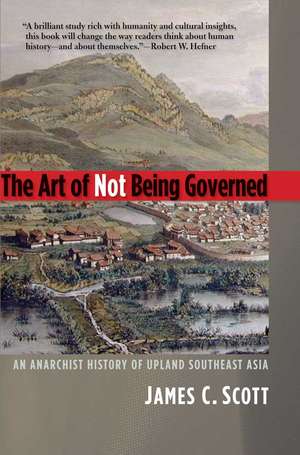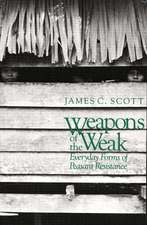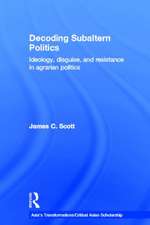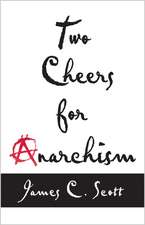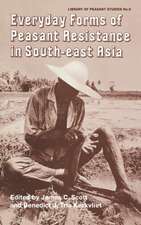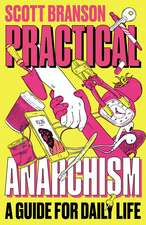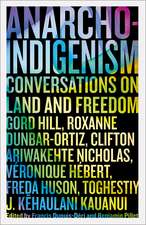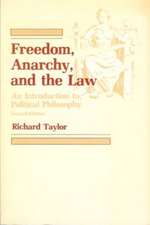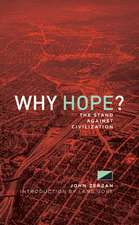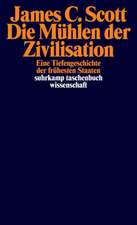The Art of Not Being Governed: An Anarchist History of Upland Southeast Asia: Yale Agrarian Studies Series
Autor James C. Scotten Limba Engleză Paperback – 30 noi 2010
For two thousand years, the disparate groups that now reside in Zomia (a mountainous region the size of Europe that consists of portions of seven Asian countries) have fled the projects of the organized state societies that surround them—slavery, conscription, taxes, corvée labor, epidemics, and warfare. This book, essentially an “anarchist history,” is the first-ever examination of the huge literature on state-making whose author evaluates why people would deliberately and reactively remain stateless. Among the strategies employed by the people of Zomia to remain stateless are physical dispersion in rugged terrain; agricultural practices that enhance mobility; pliable ethnic identities; devotion to prophetic, millenarian leaders; and maintenance of a largely oral culture that allows them to reinvent their histories and genealogies as they move between and around states.
In accessible language, James Scott, recognized worldwide as an eminent authority in Southeast Asian, peasant, and agrarian studies, tells the story of the peoples of Zomia and their unlikely odyssey in search of self-determination. He redefines our views on Asian politics, history, demographics, and even our fundamental ideas about what constitutes civilization, and challenges us with a radically different approach to history that presents events from the perspective of stateless peoples and redefines state-making as a form of “internal colonialism.” This new perspective requires a radical reevaluation of the civilizational narratives of the lowland states. Scott’s work on Zomia represents a new way to think of area studies that will be applicable to other runaway, fugitive, and marooned communities, be they Gypsies, Cossacks, tribes fleeing slave raiders, Marsh Arabs, or San-Bushmen.
Din seria Yale Agrarian Studies Series
-
 Preț: 115.71 lei
Preț: 115.71 lei -
 Preț: 311.48 lei
Preț: 311.48 lei -
 Preț: 136.13 lei
Preț: 136.13 lei -
 Preț: 258.09 lei
Preț: 258.09 lei -
 Preț: 214.69 lei
Preț: 214.69 lei -
 Preț: 194.63 lei
Preț: 194.63 lei -
 Preț: 230.87 lei
Preț: 230.87 lei -
 Preț: 386.45 lei
Preț: 386.45 lei -
 Preț: 336.24 lei
Preț: 336.24 lei -
 Preț: 349.21 lei
Preț: 349.21 lei -
 Preț: 272.69 lei
Preț: 272.69 lei -
 Preț: 274.28 lei
Preț: 274.28 lei -
 Preț: 434.01 lei
Preț: 434.01 lei -
 Preț: 400.83 lei
Preț: 400.83 lei - 23%
 Preț: 563.79 lei
Preț: 563.79 lei - 23%
 Preț: 438.96 lei
Preț: 438.96 lei - 23%
 Preț: 447.15 lei
Preț: 447.15 lei -
 Preț: 383.27 lei
Preț: 383.27 lei -
 Preț: 466.40 lei
Preț: 466.40 lei -
 Preț: 379.45 lei
Preț: 379.45 lei - 23%
 Preț: 433.11 lei
Preț: 433.11 lei - 23%
 Preț: 466.14 lei
Preț: 466.14 lei - 23%
 Preț: 567.05 lei
Preț: 567.05 lei - 23%
 Preț: 567.95 lei
Preț: 567.95 lei -
 Preț: 344.94 lei
Preț: 344.94 lei - 23%
 Preț: 445.99 lei
Preț: 445.99 lei - 23%
 Preț: 567.36 lei
Preț: 567.36 lei - 23%
 Preț: 567.95 lei
Preț: 567.95 lei -
 Preț: 485.82 lei
Preț: 485.82 lei - 23%
 Preț: 425.96 lei
Preț: 425.96 lei -
 Preț: 351.69 lei
Preț: 351.69 lei -
 Preț: 429.75 lei
Preț: 429.75 lei - 23%
 Preț: 430.48 lei
Preț: 430.48 lei -
 Preț: 335.18 lei
Preț: 335.18 lei -
 Preț: 378.48 lei
Preț: 378.48 lei - 23%
 Preț: 508.78 lei
Preț: 508.78 lei - 23%
 Preț: 430.48 lei
Preț: 430.48 lei - 23%
 Preț: 560.56 lei
Preț: 560.56 lei -
 Preț: 403.12 lei
Preț: 403.12 lei -
 Preț: 360.24 lei
Preț: 360.24 lei - 23%
 Preț: 444.18 lei
Preț: 444.18 lei - 23%
 Preț: 439.09 lei
Preț: 439.09 lei -
 Preț: 352.61 lei
Preț: 352.61 lei - 17%
 Preț: 210.78 lei
Preț: 210.78 lei - 17%
 Preț: 321.66 lei
Preț: 321.66 lei
Preț: 171.78 lei
Nou
Puncte Express: 258
Preț estimativ în valută:
32.87€ • 34.48$ • 27.36£
32.87€ • 34.48$ • 27.36£
Carte disponibilă
Livrare economică 11-25 martie
Livrare express 25 februarie-01 martie pentru 31.77 lei
Preluare comenzi: 021 569.72.76
Specificații
ISBN-13: 9780300169171
ISBN-10: 0300169175
Pagini: 464
Ilustrații: 2 b-w illus. + 7 maps
Dimensiuni: 156 x 235 x 31 mm
Greutate: 0.57 kg
Editura: Yale University Press
Colecția Yale University Press
Seria Yale Agrarian Studies Series
ISBN-10: 0300169175
Pagini: 464
Ilustrații: 2 b-w illus. + 7 maps
Dimensiuni: 156 x 235 x 31 mm
Greutate: 0.57 kg
Editura: Yale University Press
Colecția Yale University Press
Seria Yale Agrarian Studies Series
Recenzii
“James Scott has published a book making a far more ambitious argument: Zomia, he says, offers a sort of counter-history of the evolution of human civilization. . . . What Zomia presents, Scott argues . . . is nothing less than a refutation of the traditional narrative of steady civilizational progress, in which human life has improved as societies have grown larger and more complex. Instead, for many people through history, Scott argues, civilized life has been a burden and a menace.”—Drake Bennett, Boston Globe
“This book may well become a cult classic.”—Sanjay Subrahmanyam, London Review of Books
“Scott’s panoramic view will no doubt enthrall many readers. . . . One doesn’t have to see like a Zomian nor pretend to be an anarchist to appreciate the many insights in James Scott’s book.”—Grant Evans, Times Literary Supplement
“For those who live in states, savages are those who do not. Yet since the Enlightenment, there have always been Western intellectuals who want to find a critical role for the savage to play. The general idea has been to harness the otherness of indigenous or stateless people as a means of interrogating . . . the modern state. In the past twenty years or so, this project has dropped off drastically. . . . Scott has found a creative way to revive the tradition of critical thinking about the savage—and to highlight the social goals of equality and autonomy embodied in the Zomian social order that states routinely fall short of realizing.”—Joel Robbins, Bookforum
“While The Art of Not Being Governed makes an important contribution to the larger field of uplands studies (and not only the study of the Southeast Asian uplands), its merits lie ultimately in the questions that it raises and the trenchant skepticism with which it will leave the careful reader.”—Bradley C. Davis, New Mandala
“Scott’s books is refreshingly welcome. . . . The author argues his case in a clear, comprehensible, and erudite fashion leaving readers in little doubt as to where he stands. . . . It has made a significant contribution by highlighting egalitarianism and independence as the ideals of hill societies. . . . Scott has provided us with a platform for rethinking ethnic identities and inter-ethnic relations.”—Christian Daniels, Southeast Asian Studies
“If nothing else, James C. Scott’s The Art of Not Being Governed should cure the reader of putting too much faith in the smooth lines drawn on political maps. Scott’s nuanced account doesn’t romanticize the hill people, but he writes with sympathy about why they would want to have ‘all the advantages of trade without the drudgery, subordination, and immobility of state subjects.’”—Jesse Walker, Reason.org
“Scott’s thesis puts people who have been an afterthought in Asian-area studies in the spotlight.”—Ruth Hammond, Chronicle of Higher Education
“In his dazzling, enlightening, and enjoyable new book, The Art of Not Being Governed, the Yale anthropologist and political scientist boldly challenges the age-old story of ‘rude barbarians mesmerized by the peace and prosperity made possible by the king’s peace and justice.’”—Tom Palmer, Reason
“It is a clearly and beautifully argued book. . . . The Art of Not Being Governed fits together nicely with its predecessor as a landmark work of early 21st century social science. . . . It casts patterns of history into sharp relief that would otherwise languish in obscurity.”—Henry Farrell, American Interest
Received honorable mention for the 2009 PROSE Award in Government & Politics, presented by the The Professional and Scholarly Publishing Division of the Association of American Publishers
Bronze medal winner of the 2009 Book of the Year Award in the Political Science category, presented by ForeWord magazine
Chosen as A Best Book of 2009, Jesse Walker, managing editor, Reason
Winner of the 2010 Fukuoka Asian Academic Prize, given by the Fukuoka Asian Culture Prize Committee
A finalist in the category of Nonfiction for the 2010 Connecticut Book Award, given by the Connecticut Center for the Book
“James Scott has produced here perhaps his most masterful work to date. It is deeply learned, creative and compassionate. Few scholars possess a keener capacity to recognize the agency of peoples without history and in entirely unexpected places, practices and forms. Indeed, it leads him ever closer to the anarchist ideal that it is possible for humans not only to escape the state, but the very state form itself.”—Prasenjit Duara, National University of Singapore
“A brilliant study rich with humanity and cultural insights, this book will change the way readers think about human history—and about themselves. It is one of the most fascinating and provocative works in social history and political theory I, for one, have ever read.”—Robert W. Hefner, Boston University
“Underscores key, but often overlooked, variables that tell us a great deal about why states rise and expand as well as decline and collapse. There are no books that currently cover these themes in this depth and breadth, with such conceptual clarity, originality, and imagination. Clearly argued and engaging, this is a path-breaking and paradigm-shifting book.”—Michael Adas, Rutgers University
“Finally, a true history of what pressures indigenous peoples face from these bizarre new inventions called nation states. Jim Scott has written a compassionate and complete framework that explains the ways in which states try to crowd out, envelop and regiment non-state peoples. He could take out every reference to Southeast Asia and replace it with the Arctic and it would fit the Inuit experience too. We need real applicable history that works, that fits. Truth like this, it’s too darn rare.”—Derek Rasmussen, former community activist in the Inuit territory of Nunavut, advisor to Nunavut Tunngavik Inc.
“This book may well become a cult classic.”—Sanjay Subrahmanyam, London Review of Books
“Scott’s panoramic view will no doubt enthrall many readers. . . . One doesn’t have to see like a Zomian nor pretend to be an anarchist to appreciate the many insights in James Scott’s book.”—Grant Evans, Times Literary Supplement
“For those who live in states, savages are those who do not. Yet since the Enlightenment, there have always been Western intellectuals who want to find a critical role for the savage to play. The general idea has been to harness the otherness of indigenous or stateless people as a means of interrogating . . . the modern state. In the past twenty years or so, this project has dropped off drastically. . . . Scott has found a creative way to revive the tradition of critical thinking about the savage—and to highlight the social goals of equality and autonomy embodied in the Zomian social order that states routinely fall short of realizing.”—Joel Robbins, Bookforum
“While The Art of Not Being Governed makes an important contribution to the larger field of uplands studies (and not only the study of the Southeast Asian uplands), its merits lie ultimately in the questions that it raises and the trenchant skepticism with which it will leave the careful reader.”—Bradley C. Davis, New Mandala
“Scott’s books is refreshingly welcome. . . . The author argues his case in a clear, comprehensible, and erudite fashion leaving readers in little doubt as to where he stands. . . . It has made a significant contribution by highlighting egalitarianism and independence as the ideals of hill societies. . . . Scott has provided us with a platform for rethinking ethnic identities and inter-ethnic relations.”—Christian Daniels, Southeast Asian Studies
“If nothing else, James C. Scott’s The Art of Not Being Governed should cure the reader of putting too much faith in the smooth lines drawn on political maps. Scott’s nuanced account doesn’t romanticize the hill people, but he writes with sympathy about why they would want to have ‘all the advantages of trade without the drudgery, subordination, and immobility of state subjects.’”—Jesse Walker, Reason.org
“Scott’s thesis puts people who have been an afterthought in Asian-area studies in the spotlight.”—Ruth Hammond, Chronicle of Higher Education
“In his dazzling, enlightening, and enjoyable new book, The Art of Not Being Governed, the Yale anthropologist and political scientist boldly challenges the age-old story of ‘rude barbarians mesmerized by the peace and prosperity made possible by the king’s peace and justice.’”—Tom Palmer, Reason
“It is a clearly and beautifully argued book. . . . The Art of Not Being Governed fits together nicely with its predecessor as a landmark work of early 21st century social science. . . . It casts patterns of history into sharp relief that would otherwise languish in obscurity.”—Henry Farrell, American Interest
Received honorable mention for the 2009 PROSE Award in Government & Politics, presented by the The Professional and Scholarly Publishing Division of the Association of American Publishers
Bronze medal winner of the 2009 Book of the Year Award in the Political Science category, presented by ForeWord magazine
Chosen as A Best Book of 2009, Jesse Walker, managing editor, Reason
Winner of the 2010 Fukuoka Asian Academic Prize, given by the Fukuoka Asian Culture Prize Committee
A finalist in the category of Nonfiction for the 2010 Connecticut Book Award, given by the Connecticut Center for the Book
“James Scott has produced here perhaps his most masterful work to date. It is deeply learned, creative and compassionate. Few scholars possess a keener capacity to recognize the agency of peoples without history and in entirely unexpected places, practices and forms. Indeed, it leads him ever closer to the anarchist ideal that it is possible for humans not only to escape the state, but the very state form itself.”—Prasenjit Duara, National University of Singapore
“A brilliant study rich with humanity and cultural insights, this book will change the way readers think about human history—and about themselves. It is one of the most fascinating and provocative works in social history and political theory I, for one, have ever read.”—Robert W. Hefner, Boston University
“Underscores key, but often overlooked, variables that tell us a great deal about why states rise and expand as well as decline and collapse. There are no books that currently cover these themes in this depth and breadth, with such conceptual clarity, originality, and imagination. Clearly argued and engaging, this is a path-breaking and paradigm-shifting book.”—Michael Adas, Rutgers University
“Finally, a true history of what pressures indigenous peoples face from these bizarre new inventions called nation states. Jim Scott has written a compassionate and complete framework that explains the ways in which states try to crowd out, envelop and regiment non-state peoples. He could take out every reference to Southeast Asia and replace it with the Arctic and it would fit the Inuit experience too. We need real applicable history that works, that fits. Truth like this, it’s too darn rare.”—Derek Rasmussen, former community activist in the Inuit territory of Nunavut, advisor to Nunavut Tunngavik Inc.
Notă biografică
James C. Scott (1936–2024) was Sterling Professor of Political Science and Professor of Anthropology Emeritus at Yale University. His many books include Seeing Like a State, Agrarian Studies, and Against the Grain.
